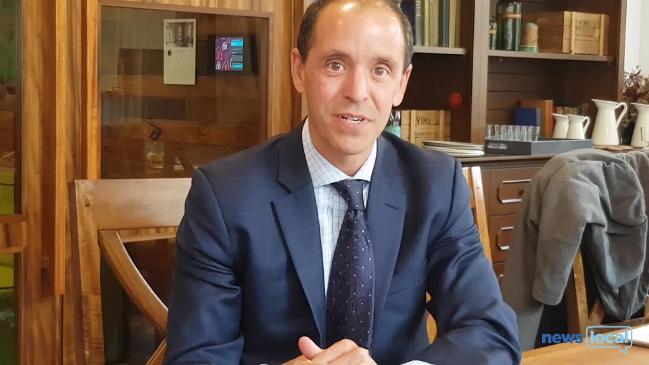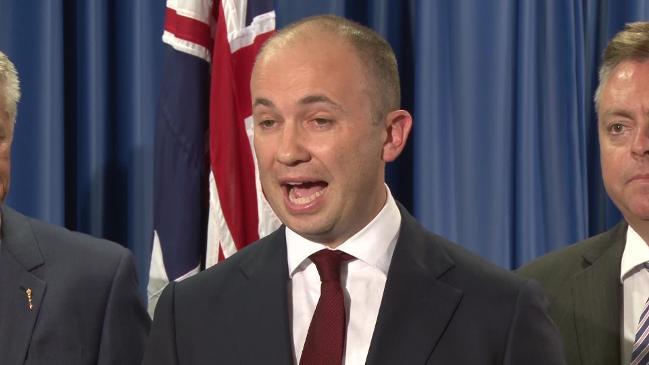New Queensland rules for Airbnb and Stayz in crackdown on illegal hotels and undercover businesses
ONLINE accommodation hosts could have their details handed to councils in a crackdown aimed at tackling “quasi-hotels” hiding in suburban streets but not facing the overheads and safety obligations of traditional operators.

QLD News
Don't miss out on the headlines from QLD News. Followed categories will be added to My News.
ONLINE accommodation hosts could have their details handed to councils in a crackdown aimed at tackling “quasi-hotels” and undercover businesses hiding in suburban streets.
Tourism Minister Kate Jones said the State Government was not targeting mums and dads using Airbnb, Stayz, and other portals to help pay the bills, but was trying to weed out illegal hotels and others gaming the system.
Under the plan, operators will get a limited number of strikes and then out, if they or their tenants cause trouble, while so called quasi-hotel operators will be targeted.
Councils will have the power to force them to meet commercial and safety standards or be shut down.
The State Government is also believed to be looking at adopting similar rules to other states, where those who live in a home can rent it out for an unlimited numbers of days, but anyone buying a home to put it on the temporary rental market is restricted to 180 days a year.

Ms Jones said they would also look at a system of data sharing in the short-term accommodation sector.
“We don’t want to target mums and dads who want to make a bit of extra coin to pay off their mortgage,” Ms Jones said.
“But it’s important for councils to be able to tell the difference between someone who is renting out their own home and someone who’s running a business.”
Airbnb host Jennifer Flinders put her Sandgate home on Airbnb three weeks ago. It had been empty while she was selling it.
She said she understood concerns about quasi-hotels but most hosts were not like that.
“It’s my place and I should be able to do what I want to do with it,” she said.
Ms Jones said huge growth in the short-term accommodation sector presented Queensland with great opportunities in the tourism industry but they couldn’t come at the expense of what made the state a tourist magnet.
“More visitors than ever before want to come to Queensland and I’m committed to growing our tourism industry over the next three years,” she said.
“We want to make it easier, not harder, for people to come to our great state.”

Under the rules being drafted by an industry reference group including councils, home share companies like AirBnB and Stayz, now known as Homeaway, the hotel sector and tourism bodies, the online companies would share their rental data with local councils, who could then use it to spot and stop “quasi hotels”.
The code of conduct comes as the State Government tries to balance the demands of the burgeoning home letting sector and the rights of homeowners, the safety and investment in traditional hotels and boosting the tourism industry.
Airbnb had been pushing for a statewide “bed tax” applied across the whole short term stay industry – a move vehemently opposed by the hotel sector and so far rejected by the State Government.
The hotel sector’s greatest concern is not mum and dad property owners who rent out part of their homes while they remain living in them but commercial operators who are setting up blocks of rentals like “quasi-hotels” but not facing the overheads and safety obligations of traditional accommodation operators.
Airbnb has 29,000 hosts in Queensland.
But battle lines are being drawn in some developments between short term renters and permanent residents.
One unit owners group is warning AirBnB and other “transitory” rentals are putting insurance cover at risk and, in some instances, making life hell for long term residents tired of dealing with endless tourist noise in what were originally residential apartment blocks.

Having chaired the government’s fourth industry reference group round table on short-term letting on Thursday, Ms Jones said the group would present a number of documents to the government in coming months, including a code of conduct.
“Tourism is a cornerstone of Queensland’s economy so it’s important that we strike a balance in our response to growth in the short-term accommodation sector,” she said.
“After a productive discussion with the industry reference group yesterday, what’s clear is the need for a clear set of guidelines to promote respect among hosts and guests here in Queensland.
“Our industry reference group will work on this code of conduct and will submit formal recommendations to the government in coming months.”
AirBnB, which had threatened to mobilise its army of hosts in a campaign against the government, welcomed the moves.
“The Queensland Government has taken a step in the right direction and we are now closer to having fair, forward-looking rules for home sharing in Queensland,” AirBnB’s Brent James said.
“The Queensland Government understands just how important home sharing has become to Queenslanders, small businesses and local communities across the State. It is helping working families make ends meet while creating thousands of local jobs.
“If implemented, these proposed reforms would protect the right of Queenslanders to responsibly share their home to earn extra income, while fairly managing rare instances of bad behaviour.”

HOME AWAY FROM HOME
WITH two small kids, a dog and a cat, being able to book a home away from home has been a “life saver” for the Tindall family.
Mum Rachel Cornock, dad Andrew Tindall, children Makaveli, 3, Azalea, 2, and their pets, have been staying at homes found on Airbnb between selling their Brisbane house a week ago and moving into their new place on Wednesday.
“The best thing for us with two kids is that we need a backyard,” Ms Cornock said.
She said being able to book homes that allowed pets and gave the children space rather than being cooped up in a hotel room had made a huge difference.
She said the family appreciated the flexibility of being able to stay in homes away from home, but she would also welcome any move to keep homeowners, renters and neighbours happy.



